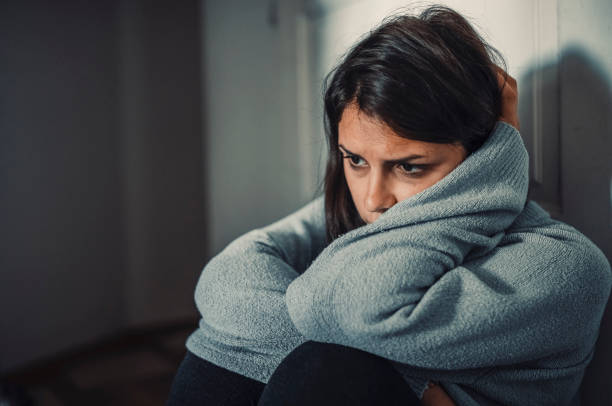What Are 9 Characteristics of Anxiety
Anxiety is a general term that refers to different anxiety disorders and emotions like: apprehension, nervousness, restlessness, etc. In this article you will read about 9 main characteristics of anxiety.
1. Worrying about the future or things that might happen
Worrying is a common symptom of anxiety disorders such as generalized anxiety disorder (GAD), panic disorder (PD) and obsessive compulsive disorder (OCD). Worrying is also seen in post-traumatic stress disorder (PTSD) and social phobia (social anxiety disorder).
Worrying about the future or things that might happen is a characteristic of anxiety. It can be hard to live with, but there are many ways to cope. If you're dealing with anxiety and have been for a while, it's easy to forget that it's possible to feel good again. The most important thing to remember is that you're not alone, and you can get through this.
2. Feeling tense and on edge
Feeling tense and on edge is a characteristic of anxiety. When you're feeling anxious, your body can react in a variety of ways: you may feel like you're on the verge of a panic attack; you may feel nauseous or dizzy; and your heart rate will increase. These physical symptoms can make it difficult to concentrate, which can make it more difficult for you to cope with the situation that's causing your anxiety.
It's important to note that these physical symptoms are temporary—they'll pass as soon as you calm down. The more stressed out and anxious you feel, however, the harder it will be for your body to return to normalcy.
3. Feeling restless, irritable, or tired
It is also normal to have these feelings when you are worried about something. However, if these feelings continue for more than a few days and interfere with your daily activities, it may be a sign that you are experiencing anxiety.
Feeling restless, irritable, or tired is a characteristic of anxiety. Other common symptoms include muscle tension, headaches, sweating and trembling, difficulty concentrating and sleeping problems. A person often has a feeling of being on edge or under stress. The anxiety disorders include generalized anxiety disorder (GAD) panic disorder, social anxiety disorder (social phobia), specific phobias and post-traumatic stress disorder (PTSD).
4. Having difficulty concentrating or thinking clearly
You may have trouble focusing on the task at hand, and it can be difficult to remember things. You may feel like your mind is racing all of the time, making it hard to relax, sleep and enjoy life.
When you're anxious, your body prepares for fight or flight, which means that you're more aware of everything going on around you. This can be helpful in some situations — if someone's sneaking up behind you, you'll hear them before they get close enough to hurt you. But it can also be overwhelming when there isn't any reason for that heightened awareness.
The good news is that these problems are normal and they will go away after a little while if you give yourself a chance to relax and rest. The bad news is that they can make it hard to do things like work or school when they're happening because they drain your energy and focus so much attention on what's happening inside your own body instead of what's happening around you in the real world
5. Being easily startled or frightened by things that would not normally scare you
You may also feel like you are constantly on guard, waiting for something bad to happen. These types of fears can cause people to avoid situations they think might result in being afraid or anxious.
If you have a history of experiencing anxiety symptoms, you may worry about experiencing them again. This worry can make it difficult to relax and enjoy yourself. If the thoughts and worries become excessive, they may interfere with your ability to function in everyday situations and relationships.
In some cases, people with anxiety disorders experience physical symptoms such as chest pain, palpitations, shortness of breath, nausea (feeling sick), dizziness (feeling faint), heavy sweating, trembling (shaking) or shaking, lightheadedness (feeling faint), abdominal cramps, headaches and/or fatigue (tiredness). These physical symptoms may be caused by the stress response or by other factors related to specific types of anxiety disorders.
6. Having trouble sleeping (insomnia) or feeling tired during the day even when you get enough sleep (fatigue)
The ability to sleep is a key part of living a healthy life. When you have trouble sleeping, it can negatively impact your ability to function during the day. It can also cause feelings of depression and hopelessness. It's important to get help for this problem if you're having trouble sleeping.
People with this condition may be unable to relax or focus on anything else until they feel as though they've dealt with their worries. Their thoughts may go back and forth between one thing after another or they might just keep thinking about the same thing over and over again. As soon as one thought ends, another begins immediately in its place — there's no rest at all!
They'll often find themselves feeling more stressed out than ever before because they can't seem to find relief from their relentless thoughts and feelings of panic or dread. This makes it extremely difficult for them to sleep through the night without waking up several times due to difficulty relaxing their minds enough.
7. Having headaches or muscle tension (aches)
If you suffer from anxiety, you may be prone to headaches and muscle tension. That's because anxiety is associated with increased levels of the stress hormone cortisol, which can cause muscle tension. Anxiety can also lead to insomnia, which in turn can contribute to headaches and/or muscle tension.
Muscle tension is not a physical symptom of anxiety, but rather a symptom of the fight-or-flight response that occurs when your body senses danger. The fight-or-flight response prepares the body for action by releasing chemicals such as adrenaline and cortisol into your bloodstream. These chemicals are responsible for making you feel anxious and on edge. They also cause tension in the muscles.
The physical symptoms of anxiety can be very uncomfortable and even painful, but they are not dangerous or harmful to your health in any way.
8. Feeling dizzy or faint when standing up suddenly from sitting or lying down (postural hypotension)
If you are feeling dizzy it could be due to the fact that you have an underlying condition such as high blood pressure, diabetes or anemia. If your cause for dizziness is not related to these health problems, then it is likely due to anxiety.
Dizziness is a symptom of anxiety that can be caused by many factors. One of the most common causes of dizziness from anxiety is from hyperventilation, which means over breathing. When we over breathe, our bodies begin to feel light headed and this includes feeling dizzy as well.
Another reason why people can experience dizziness when they are anxious is because their bodies are experiencing muscle tension due to stress and worry. This muscle tension can cause the body's muscles to feel stiff and tight leaving one feeling wobbly while standing or walking around.
If you are experiencing feelings of dizziness during an episode of anxiety, try taking slow deep breaths while focusing on something else other than your feelings at hand (such as listening to music).
9. Experiencing digestive problems like diarrhea and nausea (nausea)
Anxiety can have many different effects on your body and mind. One of the most common physical symptoms of anxiety is digestive problems such as diarrhea or nausea. Digestive problems can be caused by stress and anxiety because stress hormones cause the muscles of the digestive tract to contract more than usual which can result in diarrhea or vomiting.
The reason that anxiety can cause diarrhea and nausea is because these are also symptoms of the fight or flight response. When you are stressed out and anxious, your body releases adrenaline which causes an increase in blood sugar and an increase in blood pressure. This causes the intestines to contract which leads to diarrhea.
The nature of anxiety makes it hard to define. But one thing is certain: we shouldn't ignore the problem when it rears its head. Armed with knowledge and a willingness to seek treatment, anxiety need not ruin lives.
For more helpful and informative insights, visit here.





